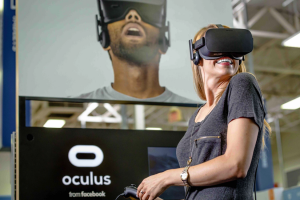
After more than 40 years of operation, DTVE is closing its doors and our website will no longer be updated daily. Thank you for all of your support.
Facebook ordered to pay US$500m in Oculus VR lawsuit
 Facebook’s VR division, Oculus has been ordered to pay US$500 million to games firm ZeniMax in a court battle over the technology used in its Rift headsets.
Facebook’s VR division, Oculus has been ordered to pay US$500 million to games firm ZeniMax in a court battle over the technology used in its Rift headsets.
The verdict, delivered in a Texas district court, ruled that Oculus co-founder Palmer Luckey had failed to comply with a non-disclosure agreement (NDA) signed with ZeniMax in 2012. However, the jury decided that Oculus had not misappropriated trade secrets.
According to gaming site Polygon, which reported from the hearing, Oculus was ordered to pay US$200 million for breaking the NDA and $50 million for copyright infringement. Oculus and Luckey were each ordered to pay US$50 million for false designation, while Oculus co-founder Brendan Iribe is to pay US$150 million for the same.
Reuters reported that the NDA was signed by Luckey in 2012 when he began discussing VR with John Carmack – a games programmer who co-founded ZeniMax-owned id Software, where he worked on popular titles like Doom and Quake.
Carmack left id Software to join Oculus as chief technology officer in 2013 – a year after Luckey and Iribe founded the firm, and a year before Facebook bought it for US$2.3 billion.
In a statement Facebook said that it was “disappointed” by the court ruling, but claimed it remained committed to the long-term success of VR. It added that it would file an appeal before “eventually putting this litigation behind us”.
In an interview with the New York Times, Facebook’s chief operating officer, Sheryl Sandberg, said that the ruling was “non-material to our business”.
The verdict came on the same day that Facebook reported that its fourth quarter profits had more than doubled year-on-year to US$3.6bn. Revenues for Q4 2016 were up 51% year-on-year to US$8.8 billion.
On the company’s earnings call, Facebook CEO Mark Zuckerberg repeated a prediction he first made last year about VR being a “10 year thing” in terms of development and wide-scale adoption.
“The analogy I always use [is] the first smartphones came out in 2003 – the Blackberry and Palm Treo – and it took 10 years to get to a billion units,” said Zuckerberg.
“If we can be on a similar trajectory of anywhere near 10 years for VR and AR, then I would feel very good about that. I feel like we’re making the right bets now to plant the seeds for that.
“But I would ask for the patience of the investor community in doing that because we’re going to invest a lot in this and it’s not going to return or be really profitable for us for quite a while.”


